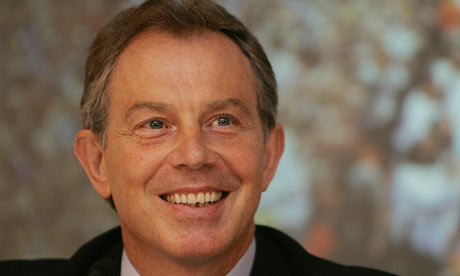
Will posterity judge Tony Blair more harshly or more kindly? Photograph: Saeed Khan/AFP/Getty Images
Politician of the decade? Even to ask the question in a purely UK context, as guardian.co.uk has been doing this week, is to be struck by a fast-changing world in which no European leader can solidly lay claim to the mantle of global statesman during the turbulent noughties.
No Chirac, Schröder, Berlusconi, no Merkel (not yet) and certainly no pillar of the Brussels bureaucracy. Vladimir Putin stablised his country at great cost, but belongs to Russia's Slav tradition, not its European one. As China and India emerged Europe seemed to shrink.
The EU politician with the energy, drive and brand-recognition charisma to have staked a claim was Tony Blair. But he hobbled his premiership over the Iraq invasion and the still echoing controversy surrounding it. Yet it is impossible not to shortlist him for the title. Love him or hate him, Blair was the dominant force.
Had Gordon Brown's premiership lived up to the post-Blair promises he so often hinted at during his long wait, his claim might have been better – but only if his 10-year stewardship of the UK economy proved durable. Instead it crashed along with bankers' reputations soon after he took over in June 2007.
Apart from Blair who else? Robin Cook is an obvious what-if candidate. Never a New Labour Blairite, Westminster's best debater rode the tiger of liberal interventionism overseas – Blair's Chicago speech which " Poodle" Bush bought into after 9/11 – until the 2003 invasion loomed and he resigned. By the time of his sudden death in 2005, Cook was reconciled with Brown. Could he have made a decisive difference to the current endgame?
Canny Alex Salmond must have a claim. Unlike those Northern Ireland politicians whose Stormont coalition emerged from bloodshed, the SNP leader started the noughties down on his luck. Ever the gambler, he bobbed and weaved, ending the decade as first minister in Holyrood's minority government. Fifty-five tomorrow, his hopes of leading Scotland to independence cannot be ruled out despite the sobering collapse of RBS and HBOS.
A female claimant? That proved harder. Margaret Thatcher, who faded away as a political force in the noughties, leaves a long shadow. But Harriet Harman, who lost cabinet office in 1998, has proved a tough survivor who always fights her political corner: the equality agenda in all the progressive manifestations that enrage many voters. Deputy leader, Commons leader, party chair, she is bloodied but unbowed.
Which Tory deserves a glance? It has been a decade of humiliation for the "natural party of government". Three leaders, Hague, Duncan Smith and Howard, fell beneath Blair's chariot. Since unexpectedly snatching the crown in late 2005 David Cameron has made erratic progress, not yet the master of his party. But he has taken them to the gates of Downing Street which he expects to occupy in 2010. That in itself is an achievement.
Nice guys often finish last. But Vince Cable's decade saw the gangling Lib Dem economist emerge as a political star: clever, funny, self-deprecating, an MP voters seemed to like and respect in a bad decade for politics. It is unlikely to make him chancellor except in the wildest of hung parliaments. Yet he deserves an accolade.
All the same it remains hard to avoid the conclusion that will be uncomfortable for many. Blair won three resounding elections, millions voted for him and not all were disappointed. Where some saw only an Iraq body count others experienced better schools, a revitalised NHS, poverty checked (but not defeated) and a society adapting to tough realities of the new global order.
Blair's strengths and weaknesses were widely shared at the time, though angrily denounced today. Will posterity judge him more harshly or more kindly? It always depends what happens next.














